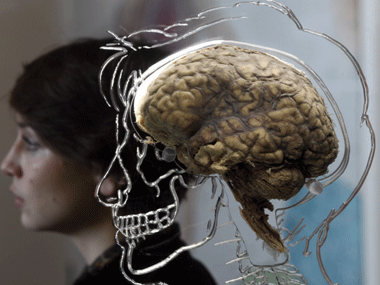A global team of 16 researchers, including doctors from two city hospitals, has identified the gene that causes an inherited brain disorder leading to delayed development of parts of nervous system. The DARS gene was diagnosed during treatment of a four-year-old boy from Punjab, along with nine other children from around the globe simultaneously. DARS causes hypomyelination with brain stem and spinal cord involvement and leg spasticity (HBSL), an inherited brain disorder which leads to delayed development of parts of nervous system due to which patient becomes unable to sit and walk without support. [caption id=“attachment_753433” align=“alignleft” width=“380”]
 PTI[/caption] The team, that included Dr IC Verma, Director, Centre for Medical Genetics of Sir Ganga Ram Hospital and Dr Monica Juneja, Department of Pediatrics of Maulana Azad Medical College, was led by Dr Ryan Taft of University of Queensland. Verma explained that disease occurred due to hypomyelination in the brain stem and spinal cord. “This occurs when individuals do not have enough ‘myelin’, the substance that coats nerve fibres and enables the transmission of electrical impulses in the nervous system, hence leading to delayed response of nervous system,” he said. Using ‘whole genome sequencing’ technique, the team found that these children were suffering from a defect in a gene, which was previously not associated with any other human disease. When asked about importance of the study, Verma said since the ailment is linked with inheritance of particular gene from parents to kids, discovering the causative gene will help in providing genetic counselling to families that will ensure the delivery of a normal child. Taft, who led the team, said they analysed genome sequences of the child from Punjab and his parents using ‘whole genome sequencing’ method, and found that a mutation in the DARS gene was likely cause of the disorder. “In collaboration with clinicians from India, Canada, Netherlands, Australia and the US, we then examined genomes of nine other children who appeared to be suffering from the same disease and the genomes of their parents and confirmed that they all had mutations in the DARS gene,” Taft said. The child from Punjab was suffering from motor developmental delay, and could not sit and walk without support. The team, which also comprised experts from VU University Medical Center, Amsterdam, Murdoch Children’s Research Institute and The Royal Children’s Hospital, Melbourne and Children’s National Medical Center in Washington DC, has published their findings in the recent issue of American Journal of Human Genetics in May 2013 edition. Apart from Dr Verma, Dr Udhaya Kotecha, Ratna Puri, Sunita Bijarnia and Jyotsana Verma from Sir Ganga Ram Hospital assisted in the research. PTI
PTI[/caption] The team, that included Dr IC Verma, Director, Centre for Medical Genetics of Sir Ganga Ram Hospital and Dr Monica Juneja, Department of Pediatrics of Maulana Azad Medical College, was led by Dr Ryan Taft of University of Queensland. Verma explained that disease occurred due to hypomyelination in the brain stem and spinal cord. “This occurs when individuals do not have enough ‘myelin’, the substance that coats nerve fibres and enables the transmission of electrical impulses in the nervous system, hence leading to delayed response of nervous system,” he said. Using ‘whole genome sequencing’ technique, the team found that these children were suffering from a defect in a gene, which was previously not associated with any other human disease. When asked about importance of the study, Verma said since the ailment is linked with inheritance of particular gene from parents to kids, discovering the causative gene will help in providing genetic counselling to families that will ensure the delivery of a normal child. Taft, who led the team, said they analysed genome sequences of the child from Punjab and his parents using ‘whole genome sequencing’ method, and found that a mutation in the DARS gene was likely cause of the disorder. “In collaboration with clinicians from India, Canada, Netherlands, Australia and the US, we then examined genomes of nine other children who appeared to be suffering from the same disease and the genomes of their parents and confirmed that they all had mutations in the DARS gene,” Taft said. The child from Punjab was suffering from motor developmental delay, and could not sit and walk without support. The team, which also comprised experts from VU University Medical Center, Amsterdam, Murdoch Children’s Research Institute and The Royal Children’s Hospital, Melbourne and Children’s National Medical Center in Washington DC, has published their findings in the recent issue of American Journal of Human Genetics in May 2013 edition. Apart from Dr Verma, Dr Udhaya Kotecha, Ratna Puri, Sunita Bijarnia and Jyotsana Verma from Sir Ganga Ram Hospital assisted in the research. PTI
Researchers identify gene that causes brain disorder
FP Archives
• May 5, 2013, 17:25:58 IST
The DARS gene was diagnosed during treatment of a four-year-old boy from Punjab, along with nine other children from around the globe simultaneously.
Advertisement
)